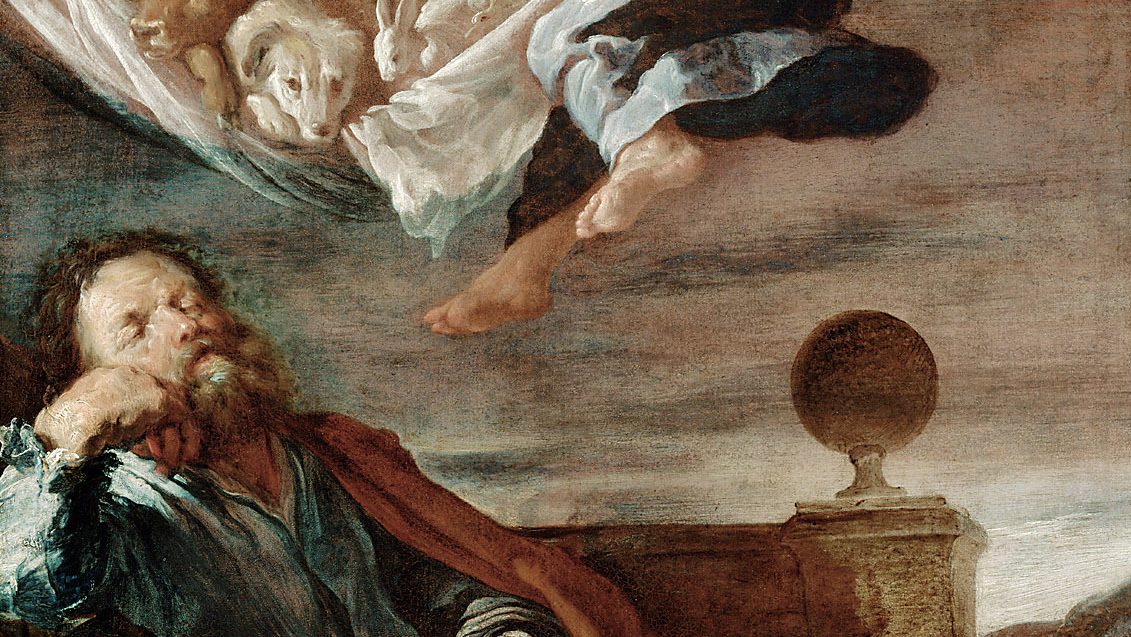

Deacon-structing the Acts of the Apostles: Proclaim It!
Deacon Pedro
Monday, May 4, 2020

Detail of Peter's Vision of a Sheet with Animals by Domenico Fetti, circa 1619. Kunsthistorisches Museum, Vienna (Source: Wikimedia Commons)
The last couple of weeks, we’ve been reading through the Acts of the Apostles. This is always where the first reading is taken from for daily Mass during the Easter Season.
So far we’ve been looking for hope (three weeks ago), joy (two weeks ago), and power (last week) in Acts.
When we read Scripture, we have to remember that we are not reading history as we understand history in the modern era. Biblical authors are not concerned with historical or factual accuracy. While the author of Acts, Luke, who also wrote the Gospel that bears his name, was concerned with certain factual elements —he makes references to other things that were happening at the time, or who the leaders at the time were — he is not very concerned with dates or the factual accuracy of how a certain event happened. This is why we need to read Scripture not as history but as theology. What happens is not as important as what we can learn from it.
This is why biblical scholars will refer to Scripture as "Biblical History" or, better yet, "Salvation History".
In the Book of Acts, the story of salvation takes a turn. So far, Israel has had prominence in God's plan of salvation. Acts begins where Jesus' ministry had ended: in Jerusalem. By the end of Acts, we are in Rome, the centre of the modern world at the time. Up until Acts, the story of salvation had been the story of God's relationship with the people of Israel. With Acts, the story of salvation begins to involve the whole world! But we are reminded of the words of Simeon that Jesus is the salvation and "a light for revelation to the Gentiles, and the glory of your people Israel” (Luke 2:32). The picture of Salvation is complete:
 Every week, Deacon Pedro takes a particular topic apart, not so much to explore or explain the subject to its fullness, but rather to provide insights that will deepen our understanding of the subject. And don’t worry, at the end of the day he always puts the pieces back together. There are no limits to deaconstructing: Write to him and ask any questions about the faith or Church teaching: pedro@saltandlighttv.org
Every week, Deacon Pedro takes a particular topic apart, not so much to explore or explain the subject to its fullness, but rather to provide insights that will deepen our understanding of the subject. And don’t worry, at the end of the day he always puts the pieces back together. There are no limits to deaconstructing: Write to him and ask any questions about the faith or Church teaching: pedro@saltandlighttv.org
“It is too small a thing for you to be my servant to restore the tribes of Jacob and bring back those of Israel I have kept. I will also make you a light for the Gentiles, that my salvation may reach to the ends of the earth.” (Isaiah 49:6)This is why the Apostles begin preaching in the synagogues but then move on to the non-Jews, the Gentiles. This is why, I believe, that Saul changes his very Jewish name to a Greek name, Paul. Keep this in mind as we continue reading with chapter 11. Get your Bible and open it to the Acts of the Apostles and read along. On Monday, we continue with Peter as he has just returned from Joppa. He is confronted by Jewish Christians who challenge him about entering the house of, and eating with, Gentiles. Peter explains a dream that he had and why he ended up realizing that the message of the Gospel is also for the Gentiles (Acts 11:1-18). Then, on Tuesday, we begin to see how the Church is spreading. There are now believers in Phoenicia, Cyprus, and Antioch. We learn that Barnabas is sent to Antioch and then to Tarsus to look for Saul to bring him back to Antioch. This is where the disciples were first called Christians (Acts 11:19-26). On Wednesday, we skip to about a year later when Barnabas and Saul return to Jerusalem. With them now is John Mark (believed to be the author of the Gospel of Mark). After fasting and prayer it is decided that Barnabas and Saul should go on their first journey (Acts 12:24-13:5a). On Thursday, we continue with Saul, who is now called Paul, and his journey with Barnabas. John Mark leaves them to return to Jerusalem. Paul and Barnabas go to the synagogue in Antioch in Pisidia, and we hear Paul’s first sermon (Acts 13:13-25). On Friday, Paul’s sermon continues (Acts 13:26-33), and on Saturday, we learn that the whole city (not just the Jews) wanted to hear Paul and Barnabas, and the Jews were jealous and violently contradicted what Paul said (Acts 13:44-52). Thus begins the ardent proclaiming to the Gentiles. This is a week where we see how the Church was growing. This is what happens when we are under the power and guidance of the Holy Spirit. Jesus gives us a message of hope and being with Him fills us with joy, but it is the Spirit that fills us with power, and that power is what makes the Church grow. And not only does the Church grow, but it grows wherever the Spirit wants her to grow. The message of the Gospel is not just for a few: it is for the whole world. I always find it amazing that Christianity seems to be one of the few (if not the only) religion that is apostolic. No other religion seems to have the mandate to “go and make disciples”. This is the last thing that Jesus tells his Apostles in Matthew 28:18-20. It is the Great Commission. And because it is the last thing Jesus tells the Apostles, they take it seriously. I wouldn’t be here, writing this and working for a Catholic media organization, some 2000 years later, had those Apostles not taken Jesus’ words seriously. But then, so did their disciples. This week, we see that the Church grows because the disciples are out there doing what we are all supposed to be doing: proclaiming the Good News. This week, as you go through chapters 11 , 12, and 13 of the Book of Acts, remember the Great Commission and contemplate how the Church was able to grow during those early days. As we read through the Acts of the Apostles, it’s good to remember that those “acts” must continue today. We are the apostles that are being sent to proclaim the Good News, not so that the Church grows, but so that people can get to experience the hope and joy that comes with meeting Jesus Christ. Come back next week so we can continue looking for hope and joy and see more acts of power and growth in the Book of Acts.
 Every week, Deacon Pedro takes a particular topic apart, not so much to explore or explain the subject to its fullness, but rather to provide insights that will deepen our understanding of the subject. And don’t worry, at the end of the day he always puts the pieces back together. There are no limits to deaconstructing: Write to him and ask any questions about the faith or Church teaching: pedro@saltandlighttv.org
Every week, Deacon Pedro takes a particular topic apart, not so much to explore or explain the subject to its fullness, but rather to provide insights that will deepen our understanding of the subject. And don’t worry, at the end of the day he always puts the pieces back together. There are no limits to deaconstructing: Write to him and ask any questions about the faith or Church teaching: pedro@saltandlighttv.orgRelated Articles:
Category: Deacon-structing, Lent and Easter
Tag: Acts of the Apostles, Easter, Holy Spirit
Deacon-structing: What is a Heresy?
Tuesday, November 12, 2024
 Deacon Pedro
Deacon Pedro
What is the difference between heresy and simple disagreement? Looking at some of the main heresies throughout history might light the way forward.
Deacon-structing: What is Excommunication
Saturday, July 13, 2024
 Deacon Pedro
Deacon Pedro
Ever wonder what "excommunication" really means? Deacon Pedro navigates the canonical web to tell us all about it.
Pope Francis’ homily for Pentecost Sunday 2024
Sunday, May 19, 2024
 Pope Francis
Pope Francis
The account of Pentecost (cf. Acts 2:1-11) shows us two areas of the Holy Spirit’s working in the Church: in us and in mission, with two characteristics: power and gentleness.
Pope Francis’ Homily at Holy Mass in St. Mark’s Square, Venice
Sunday, April 28, 2024
 Pope Francis
Pope Francis
Jesus is the vine; we are the branches. Like a patient farmer, God, the merciful and good Father, tenderly cultivates us so that our lives may be filled with much fruit.
Two Decades Since Sherbrooke’s Monastery Fire
Friday, April 26, 2024
 Peter Rajchert
Peter Rajchert
In January, 2003, Sherbrooke's St. Clare Monastery burned down. It was rebuilt two years later, a true sign of resurrection.
1
2
3
4
5
6
7
8
9
10
11
...
146
>>
SUPPORT LABEL
$50
$100
$150
$250
OTHER AMOUNT
DONATE
Receive our newsletters
Stay Connected
Receive our newsletters
Stay Connected










